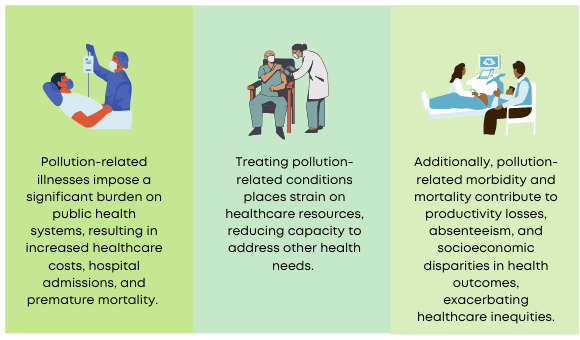Respiratory Illnesses
Pollution irritates the respiratory system, causing asthma, bronchitis, and aggravated COPD.
Long-term exposure worsens symptoms and can lead to chronic conditions.
Cardiovascular Diseases
Pollutants trigger systemic inflammation and impair blood vessel function, promoting plaque formation and clot formation, increasing the risk of heart attacks and strokes.
Long-term exposure increases cardiovascular morbidity and mortality.
Neurological Disorders
Certain pollutants, such as heavy metals, pesticides, and volatile organic compounds (VOCs), have neurotoxic properties that can adversely affect the nervous system.
Chronic exposure to these pollutants is linked to neurodevelopmental disorders in children, cognitive decline in adults, and an increased risk of neurological conditions such as Alzheimer’s disease, Parkinson’s disease, and multiple sclerosis.
Cancer Risk
Exposure to carcinogenic pollutants, including benzene, formaldehyde, polycyclic aromatic hydrocarbons (PAHs), and heavy metals like arsenic and cadmium, increases the risk of various cancers. Polluted air, water, and soil can contain these carcinogens, which may enter the body through inhalation, ingestion, or skin absorption.
Over time, exposure to these pollutants can lead to the development of lung cancer, bladder cancer, leukemia, and other malignancies.
Immune System Compromises
Pollutants can disrupt immune system function, leading to dysregulation of immune responses and increased susceptibility to infections, autoimmune diseases, and chronic inflammation. Particulate matter and pollutants like ozone and sulfur dioxide can induce airway inflammation, impairing the immune system’s ability to defend against respiratory infections.
Prolonged exposure to pollution may also exacerbate existing autoimmune conditions and inflammatory disorders.
Vulnerable Populations
Vulnerable populations, including children, the elderly, pregnant women, and individuals with pre- existing health conditions, are at increased risk of adverse health effects from pollution exposure.
Children have developing organ systems and higher breathing rates, making them more susceptible to pollutants’ effects. Elderly individuals may have underlying health conditions that exacerbate pollution-related illnesses. Pregnant women and fetuses are vulnerable to pollutants’ teratogenic effects and developmental toxicity.


